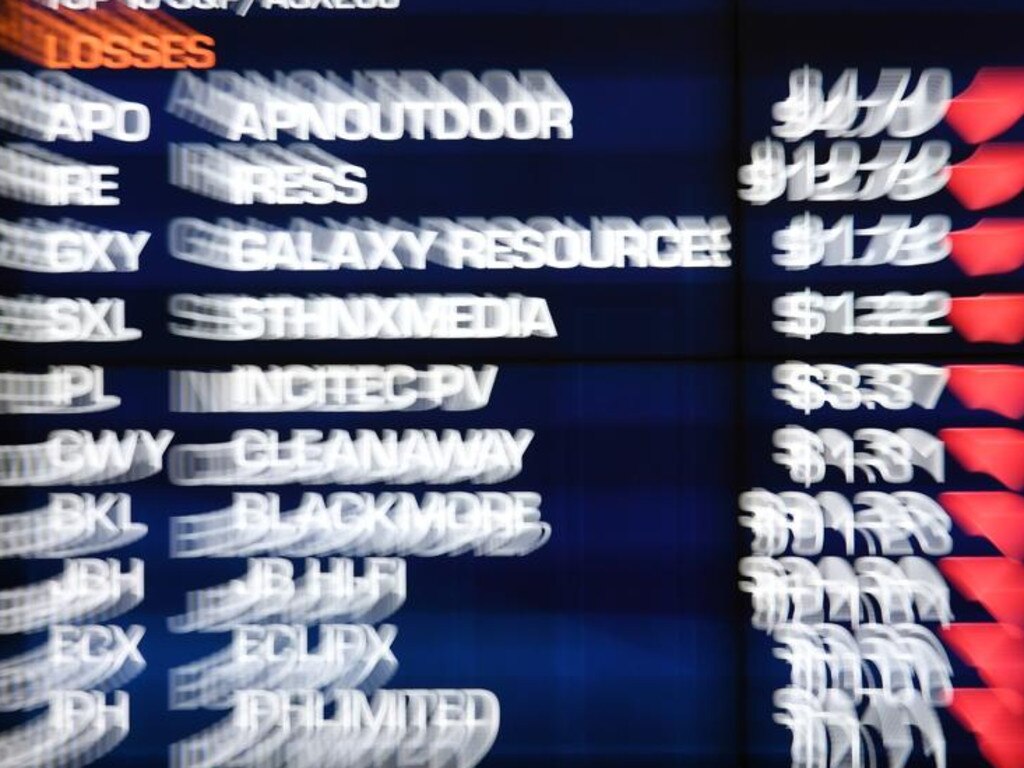
From a red hot market at risk of a “melt up” in early February to a level now of 5725.9 which is more than 20 per cent below the top. That’s a bear market on speed.
You might say we have only landed just millimetres inside the bear pit. True, to be precise the ASX is just 3 points on the wrong side of the line.
But any spell on the market where the nation’s biggest bank, CBA, can fall by 7 per cent in a single session means we are in treacherous waters.
With speculation that banks will struggle to pay full dividends in the coming term, all bank stocks fell on Wednesday. CBA’s 6.6 per cent decline was flanked by ANZ down 5.5 per cent, NAB 6.3 per cent and Westpac 5.3 per cent.
As the most important sector by market capitalisation on the exchange, the direction of bank stocks will generally swing the wider market – earlier in the week the reverse occurred.
Interestingly, just as the major banks chief executives were meeting Treasurer Josh Frydenberg to discuss the efforts they might make to support businesses around the country, National Australia Bank issued a report which suggested: “Banks are resilient to market disruption and there is no major pressure in local markets.”
But investors on the day were paying precious little attention to banks defending banks, rather they were selling down for a raft of reasons, the most obvious being the banks might be forced to sacrifice their margins under the Prime Minister’s stimulus package.
As for overall direction in the market, the essential feature to note was US futures were down again and that gave the ASX its negative lead.
We now have a market that is not just following Wall Street, but anticipating what Wall Street is anticipating. That’s why local traders ignored a very strong earlier session on major US indices.
The NAB Markets Research team was also estimating the international travel fell 21 per cent in February with further declines to come.
The latest travel sector profit downgrades came from Helloworld and Webjet. Indeed Webjet CEO David Gault joined Qantas CEO Alan Joyce and Air New Zealand Greg Foran in taking a voluntary pay cut.
With fear emerging as the dominant emotion among traders, the Spruce Point Capital group of New York picked a fine day to publicly launch what it described as a “core” short on Amcor suggesting the company faces a downside of “40 to 60 per cent”.
The paper and packaging company, which recently took over the US based Bemis group, finished the day further down than most of its peers with a drop of 7 per cent, though in this atmosphere, it is difficult to tell just how effective the short call has been,
Amcor, becomes an involuntary member of a growing club of stocks where there is a very public shorting campaign in the market against it. Others in the club include WiseTech Global and Corporate Travel.
The Amcor battle should be particularly interesting as it has deeper pockets and a strong historic connection with local institutional investors.
The short “thematic” on Amcor is partially based on the “greening” of corporate America, which the Spruce group believes will leave Amcor on the wrong side of history.
Property trusts that had not managed to catch the limited upside available on Tuesday were somehow resistant on Wednesday with several of the major property trusts, or A-REITs, finishing a little higher including Dexus, Goodman and GPT.
BHP which had some further bad news in what has been a particularly bad week as the diversified resources group is also an oil producer - fell another 2.5 per cent after a High Court decision on the term “associate” as it relates to tax purposes. The decision will cost the Big Australian an expected $125m.







Whoosh! That was fast.